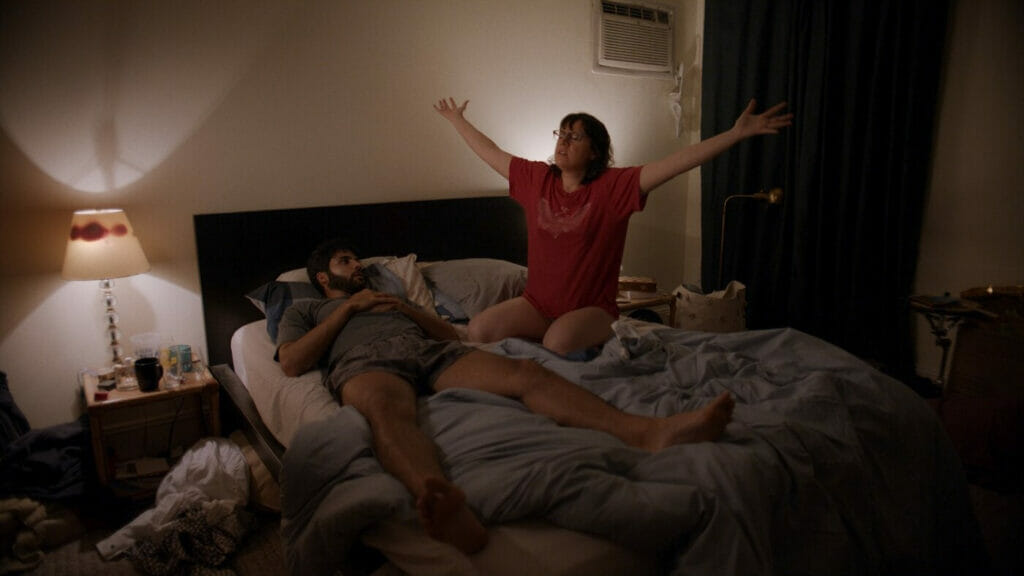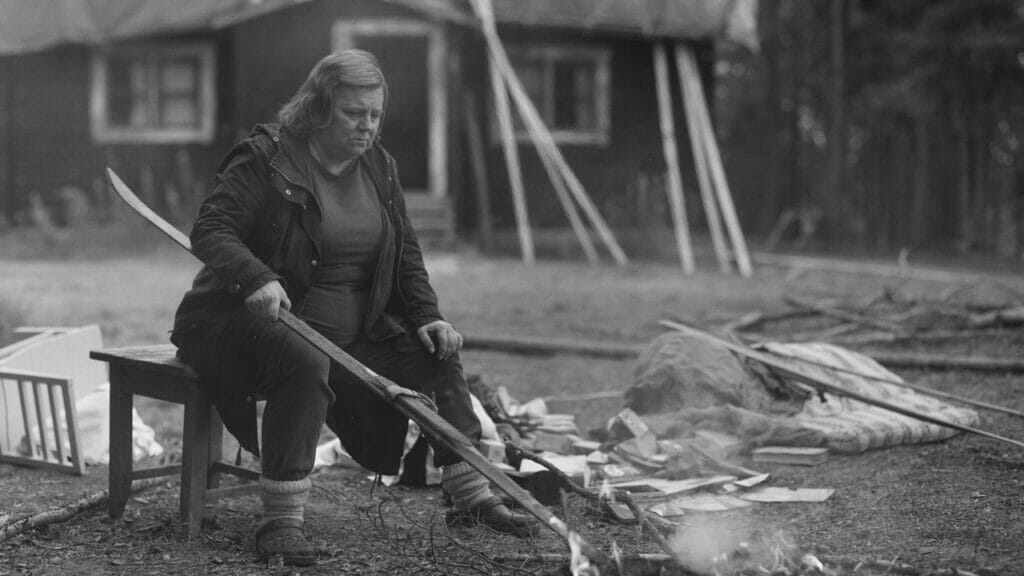John Carney’s new drama is just one of a diverse collection of features at this year’s Toronto International Film Festival.
This piece was written during the 2023 WGA and SAG-AFTRA strikes. Without the labor of the writers and actors currently on strike, the works being covered here wouldn’t exist.
Irish filmmaker John Carney made his big breakthrough in 2007 with Once, a film focused on the redemptive power of music and its ability to bring people, whether they are strangers or family, together in the pursuit of creating something that allows them to give voice to their once-buried hopes and desires. This was followed by Begin Again (2013), a film focused on the redemptive power of music and its ability to bring people, whether they are strangers or family, together in the pursuit of creating something that allows them to give voice to their once-buried hopes and desires. After that came Sing Street (2016), a film focused on the redemptive power of music and its ability to bring people, whether they are strangers or family, together in the pursuit of creating something that allows them to give voice to their once-buried hopes and desires.
Now—and I think you can probably see where I am going with this—Carney has returned with Flora and Son, a film that focuses on the redemptive power of music and its ability to bring people, whether they are strangers or family, together in the pursuit of creating something that allows them to give voice to their once-buried hopes and desires.
Returning to working-class Dublin, the setting of all those previous efforts save Begin Again, the film tells the story of Flora (Eve Hewson) a young woman who dropped out of school at 17 when she got pregnant by an American musician (Jack Raynor) and is struggling to raise the now-14-year-old Max (Oren Kingman), an aspiring thief who is one misstep away from jail. Having forgotten his birthday, Flora spies an acoustic guitar in a garbage bin and impulsively decides to retrieve it, fix it up and give it to Max as a belated gift in the hope that it will keep him out of trouble. When he rejects it out of hand, she impulsively decides to learn to play it herself, signing up for online guitar lessons with L.A.-based teacher Jeff (Joseph Gordon-Levitt). Soon, the two are collaborating on music together and this leads to her finding ways to redefine her relationships with her child, her ex and yes, even herself as well.

Like Carney’s previous films, Flora and Son essentially wears its innate desire to be liked—nay, adored—on its sleeve with its mixture of charismatic stars, peppy tunes and easygoing charm. That said, even those who enjoyed those earlier efforts may find this to be somewhat clunkier than usual thanks to the inclusion of too many subplots (including Flora’s unresolved feelings for her ex, Max’s criminal tendencies and the crush on a neighbor girl that he attempts to convey through his own musical endeavors) that end up distracting from Flora’s own growth process through the power of music. The relationship that develops between Flora and Jeff also fails to completely click as well: compared to the natural chemistry between the leads that gave Once its spark, what transpires here is not particularly convincing. Another problem is that the music this time around is not quite as catchy as in those earlier films: if you are going to have a character excoriating the work of James Blunt as meaningless fluff, as Jeff smugly does here, you should endeavor to come up with music that doesn’t sound like his leftovers.
And yet, while Flora and Son is by far the lesser of Carney’s musical endeavors, it isn’t completely without merit either. During the scenes where it isn’t trying to insist its adorable nature upon viewers and simply relaxes, it demonstrates some glimpses of actual charm and a couple of nice moments of rude humor as well. The best thing about it, however, is Hewson, who, being the real-life daughter of Bono, certainly has the musical bonafides for the role. At first glance, she may not seem entirely convincing as a young woman struggling to get by and keep her obnoxious son out of trouble while finding some kind of meaning to her own life (“This can’t be my narrative,” as she says in one especially on-the-nose moment). But as things progress, the combination of rude charm and vulnerability that she conveys begins to click and even as the story threatens to become too cutesy and implausible for its own good, she helps keep things mostly down to earth. Flora and Son may not offer viewers much that they haven’t already seen before but, like a decent cover version of a favorite song, it’s just entertaining enough to keep you involved without making you forget that you’ve heard it all before and better boot.
A far pricklier story of an unmoored young woman trying to figure out who she is could be found at the center of The Feeling That the Time for Doing Something Has Passed, the debut feature for writer-director-star Joanna Arnow. She plays Ann, a woman in her early thirties who finds herself unmoored from her surroundings both personally and professionally. Her work consists of serving as a “Clinical eMedia Learning Specialist” in a bland New York corporate office where her presence is so superfluous that at one point, she receives a tiny trophy to commemorate her first anniversary even though she’s worked there for three years. Outside of work, she splits her time between her parents (played by Arnow’s real-life parents, David Arnow and Barbara Weiserbs) and Allen (Scott Cohen), an older man with whom she is in a long-term BDSM relationship in which he barely seems to acknowledge her presence.

During the opening scenes, Arnow stumbles a bit while trying to find the right tone, and there are times when it feels like an exceptionally long and odd episode of Girls. As things progress, however, she finally finds the right rhythm for the material and comes up with a number of very funny (albeit cringeworthy) scenes, especially in her efforts to date someone closer to her own age, including another dom (Parish Bradley) and Chris (Batak Tafti), a friendly guy that she finds herself responding to despite his utter lack of knowledge regarding kink. The film doesn’t always work: the material involving her parents offers a couple of laughs but not much else and Arnow never quite figures out a way to bring the material to a satisfying conclusion (though one could just as easily argue that this is her point).
That said, combining sprung-rhythm romantic escapades with a quiet meditation of the ways in which neurotic Millennials finds themselves at the personal and professional mercy of older Boomers is undeniably ambitious, and yields more hits than misses. The Feeling That the Time for Doing Something Has Passed is not for everyone (it couldn’t be further away from the crowd-pleasing determination of Flora and Son if it tried) but those who do spark to it will come away feeling as if they have made a genuine discovery.
Decidedly different in virtually every way from everything else covered here, Katja Gauriloff’s Je’vida is the first film to fully employ the dialect of the Skolt Sami people of Lapland, a language whose native speakers number about 300. It endeavors to illustrate the heartbreaking repercussions of post-war Finnish authorities to essentially eliminate them entirely through the eyes of one person caught up in it all. As the film opens, two women are traveling to Lapland in the wake of a woman’s death to clean out the remote lakeside home that was left to them. One is Sanna (Seidi Haarla), the woman’s daughter and the other is Lida (Sanna-Kaisa Palo), the woman’s sister, who Sanna is meeting for the very first time. While Sanna is intrigued by this home and an aspect of her mother’s life that she never knew about, Lida resents being there and only wants to leave as soon as possible, burning up everything that she can in the interim.

Eventually, Sanna gets Lida to begin to open up and she tells her sad story. As a child known as Je’vida (played by Agatha Niemenmaa), she was perfectly content to live in the ways of her people under the tutelage of her beloved grandfather (Erkki Gauriloff). When he passes, her mother, who is all for assimilation, sends her and her older sister off to a boarding school in order to better integrate them into proper Finnish culture. There, she suffers cruelties from classmates and teachers alike because of her differences (including the loss of her name) that eventually drive her to become a bully as well as a survival mechanism. When we see her years later (played by Heidi Juliana Gauriloff), we learn just how well that assimilation took: after a visitor from the South offers the promise of a way out of the grim North, she is mortified when her grandmother comes to visit and risks exposing her hidden roots.
Je’vida is mostly grim and unsparing stuff and that, combined with its austere pacing, may put off a number of viewers. That would be their loss, because Gauriloff has created a potent and powerful work that serves both as the story of Lida coming to terms with the whole of her life and the memories she tried to put aside, and a celebration of a people whose entire existence has been under siege from those who wish they and their differences would simply disappear. Gauriloff is able to convey this sense of sorrow and anger through stark imagery, a spare but often harrowing and heartbreaking storyline and gripping performances from the three people recruited to portray Je’vida at varying points in her life. This is a strong and assured filmmaking debut that, more importantly, shines a light on the myriad ways in which an entire culture has been systematically threatened with eradication and how it has still managed to survive those efforts in order to allow its story to finally be told.
Read next: The Spool's Best New Releases
Streaming guides
The Best Live TV Streaming Services With Free Trial
The praises of live TV streaming services don’t need to be further sung. By now, we all know that compared to clunky, commitment-heavy cable, live TV is cheaper and much easier to manage. But just in case you’re still on the fence about jumping over to the other side, or if you’re just unhappy with ... The Best Live TV Streaming Services With Free Trial
How to Watch Power Book III: Raising Kanan Season 3
Season 3 of the hotly anticipated Power spin-off, Power Book III: Raising Kanan, is arriving on Starz soon, so you know what that means: it’s the ’90s again in The Southside, and we’re back with the Thomas family as they navigate the ins and outs of the criminal underworld they’re helping build. Mekai Curtis is ... How to Watch Power Book III: Raising Kanan Season 3
How to Watch Doctor Who: 60th Anniversary Specials
Ladies and gentlemen, we’re so back! To celebrate Doctor Who’s 60th anniversary, the BBC is producing a three-episode special starring none other than the Tenth/Fourteenth Doctor himself, David Tennant. And to the supreme delight of fans (that would be me, dear reader), the Doctor will be joined by old-time companion Donna Noble (Catherine Tate) and ... How to Watch Doctor Who: 60th Anniversary Specials
Which Netflix Country has Interstellar?
Maybe you’ve just seen Oppenheimer and have the strongest urge to marathon—or more fun yet, rank!—all of Christopher Nolan’s films. Or maybe you’re one of the few who haven’t seen Interstellar yet. If you are, then you should change that immediately; the dystopian epic is one of Nolan’s best, and with that incredible twist in ... Which Netflix Country has Interstellar?
Which Netflix Country Has Each Movie of The Hunger Games?
For whatever reason, The Hunger Games series isn’t available in the same countries around the world. You’ll find the first and second (aka the best) installments in Hong Kong, for instance, but not the third and fourth. It’s a frustrating dilemma, especially if you don’t even have a single entry in your region, which is ... Which Netflix Country Has Each Movie of The Hunger Games?
How to Watch ESPN With A Free Trial
One of the major concerns people have before cutting the cord is potentially losing access to live sports. But the great thing about live TV streaming services is that you never lose that access. Minus the contracts and complications of cable, these streaming services connect you to a host of live channels, including ESPN. So ... How to Watch ESPN With A Free Trial
How to Watch Paramount Network With a Free Trial
To date, Paramount Network has only two original shows on air right now: Yellowstone and Bar Rescue. The network seems to have its hands full with on-demand streaming service Paramount+, which is constantly stacked with a fresh supply of new shows. But Yellowstone and Bar Rescue are so sturdy and expansive that the network doesn’t ... How to Watch Paramount Network With a Free Trial
How to Watch WE TV With a Free Trial
Previously “Women’s Entertainment,” We TV has since rebranded to accurately reflect its name and be a more inclusive lifestyle channel. It’s home to addictive reality gems like Bold and Bougie, Bridezillas, Marriage Boot Camp, and The Untold Stories of Hip Hop. And when it’s not airing original titles, it has on syndicated shows like 9-1-1, ... How to Watch WE TV With a Free Trial
How to Watch TNT Sports With A Free Trial
For many sports fans, TNT is a non-negotiable. It broadcasts NBA, MLB, NHL, college basketball, and All Elite Wrestling matches. And, as a bonus, it also has reruns of shows like Supernatural, Charmed, and NCIS, as well as films like The Avengers, Dune, and Justice League. But while TNT used to be a cable staple, ... How to Watch TNT Sports With A Free Trial
How to Watch Comedy Central With a Free Trial
It’s no coincidence that many of today’s biggest comedians found their footing on Comedy Central: the channel is a bastion of emerging comic talents. It served as a playground for people like Nathan Fielder (Fielder For You), Ilana Glazer and Abbi Jacobson (Broad City), Tim Robinson (Detroiters), and Dave Chappelle (Chappelle’s Show) before they shot ... How to Watch Comedy Central With a Free Trial
How to Watch FX With a Free Trial
You’d be hard-pressed to find a bad show airing on FX. The channel has made a name for itself as a bastion of high-brow TV, along with HBO and AMC. It’s produced shows like Atlanta, Fargo, The Americans, Archer, and more recently, Shogun. But because it’s owned by Disney, it still airs several blockbusters in ... How to Watch FX With a Free Trial